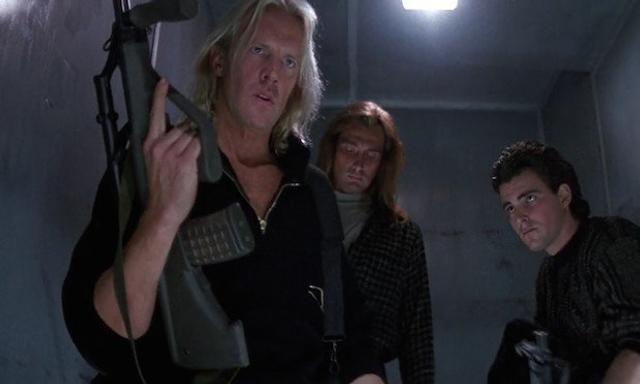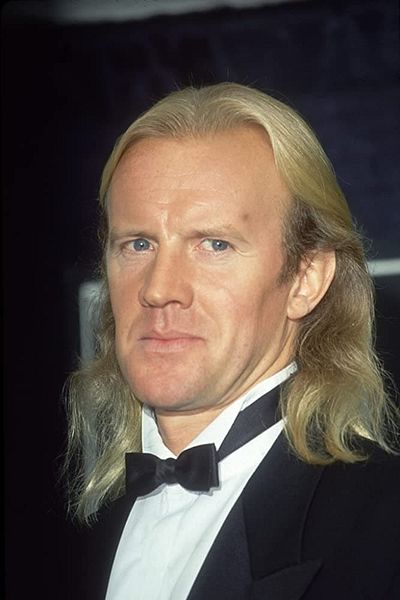Alexander Godunov is not a name that has immediate recognition, however you almost certainly know him from either one of three diametrically-opposed films - Die Hard, The Money Pit or Witness.
While starring in two classics and virtually nothing else is fascinating in its own right, what's more interesting is how he actually came to be there in the first place.
Alexander Borisovich Godunov was born in 1949 off the coast of Russia in a place called Sakhalin Island. From the age of nine, Godunov was trained in ballet alongside Mikhail Baryshnikov. The two became fast friend and lifelong friends, but would have a falling out that sparked his career into motion. More on that later.
Godunov was an outspoken admirer of American culture and flew in the face of Soviet conservatism in both his personal appearance and his beliefs. From the very beginning of his professional career, he was at odds with his handlers. By 1978, Godunov was the lead dancer in the famous Balshoi ballet and renowned across the globe.
In 1979, Godunov and his wife, Ludmila Vlaslova, were performing in New York as part of the Balshoi Ballet. Again, Godunov made several comments to journalists about his admiration for America and its freedoms which rankled both Soviet diplomats and his colleagues in the Bolshoi. However, on August 21st of the same year, he'd take a step further. Godunov and two other ballet dancers contacted the US State Department and asked for political asylum so they could defect from the USSR. The news made international headlines immediately, with Godunov's name and face on newspapers worldwide.
The KGB moved quickly to stop further defections from the ballet group and put Godunov's wife on a jet back to Moscow. However, the US State Department intervened and refused to let the jet takeoff, believing that Ludmila was doing so under duress from the KGB. It wasn't until President Jimmy Carter and Russian Premier Leonid Brezhnev intervened that Ludmila was allowed leave the States and return home - without Godunov. The two would never see one another again and in 1982, the two were divorced. Years later, Ludmilla said that Russia "was brutal to him. He was always an independent and proud person, with his beautiful long hair. They wanted him to cut it. That's why he didn't like bureaucrats."
Godunov went to work his friend, Mikhail Baryshnikov, however the two soon had a falling out. Godunov would later say that his lifelong friend threw him away "like a potato peel." Godunov had some acting experiences in the Soviet Union and was eager to try his hand in American films. In 1985, Godunov was cast as Daniel Hochleitner in Peter Weir's noir drama, Witness. The Soviet actor portrayed an Amish farmer who was enamoured with Kelly McGinnis; the role won Godunov rave reviews for his debut English-language performance.
Eager to continue, Godunov next signed up to the Tom Hanks-Shelley Long screwball comedy, The Money Pit. He played an egotistical classical musician, not a million miles away from his own personality. Godunov gained a reputation as a perfectionist and frequently turned down roles that he felt he could bring nothing to. In 1988, Godunov was cast in Die Hard alongside Bruce Willis and Alan Rickman. Godunov played Karl, the lead henchman for Hans Gruber whose brother is killed by John McClane early in the film. Director John McTiernan would later remark that Godunov's fluidity and ability to work well with stunts and fight sequences was due to his ballet training.
However, Godunov felt the role was an albatross around his neck. In an interview some time after Die Hard was released, he said that he was offered typecasted roles. ""After Die Hard, obviously, I am offered to play bad guys. I had a treatment to read, and I called back to say, 'But this doesn't say anything about my character.' And they said: 'Oh, you are going to wear a long black coat, and you will walk into a restaurant and you will pull out of your pocket a gun machine and shoot half of them." Godunov struggled with alcoholism throughout his time in America and reportedly celebrated his American citizenship by eating a hamburger stuffed with caviar.
By 1990, Godunov was reduced to starring in direct-to-video schlockfests like The Runestone and Waxwork 2: Lost In Time. In 1995, he starred in the dramedy North, playing an Amish father and essentially lampooning his role in Witness. The film, which starred Bruce Willis, was critically panned and bombed commercially. Godunov turned down role after role, often very lucrative parts in high-profile films, because they had no essence of character for him. His publicist, Evelyn Shriver, said in a 1991 interview that "his instincts are always very right. He won't just grab at something, he'll say: 'What's the point of the movie, what does it mean?' And I'm saying: 'Who cares what it means? How often does a movie mean anything? Just take it!' You'd think at this point in his career he would panic - but no... From the point of view of the publicist, if you are not out there every year or two, the world will forget you."
Godunov would star in a direct-to-video action film called Dogfighters that filmed in Bulgaria in 1995. The film wasn't released theatrically and, for the most part, the role was similar to roles he had turned down after Die Hard. He most likely took the role out of desperation and for money, however agents and friends were glad to hear he was working again. Already, producers like Joel Silver were beginning to line up work for him and get him back on track.
Sadly, it wasn't to be. His friends became concerned when he stopped calling and, fearing the worst, sent a nurse to his home on May 18th, 1995. Godunov was reportedly dead a few days, with the coroner's report citing chronic alcoholism and complications from hepatitis. Initial reports suggested that he was secretly suffering from AIDS and had committed suicide, however these were found to be untrue.
Many remarked that Godunov's life went into a slow decline once he finally got what he wanted; others believed that he was too innocent for the Hollywood machine and too impetuous to take on roles he felt beneath him. What's clear is that, in the small amount of film work he did, he left a lasting impression.











































































